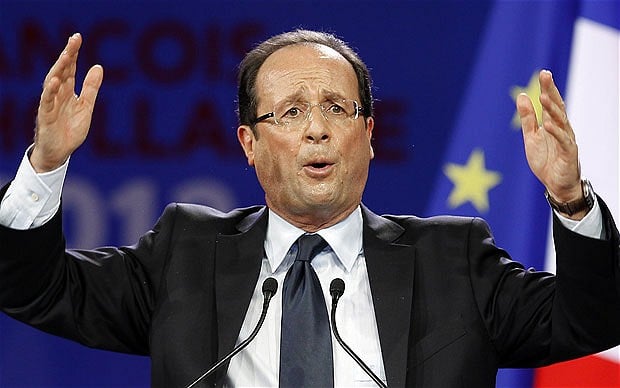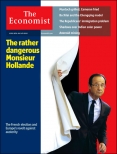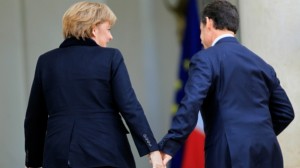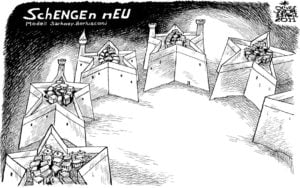 In its latest issue, the weekly British magazine the Economist called Mr. Hollande, the Socialist candidate to the French presidency, the most dangerous man of Europe. Even though this statement is not only a smart marketing move, it appears out of line considering the behavior of Britain in Europe. Without launching an anti-British attack, it is quite interesting to see a British magazine describing the possible next president of France, democratically elected by universal suffrage, as the most dangerous man in Europe after the campaign ran by Mr. Cameron. The narratives emanating from Cameron’s party have not been historically pro-European, to the extent that members of his party have been calling for Britain’s departure from the EU.
In its latest issue, the weekly British magazine the Economist called Mr. Hollande, the Socialist candidate to the French presidency, the most dangerous man of Europe. Even though this statement is not only a smart marketing move, it appears out of line considering the behavior of Britain in Europe. Without launching an anti-British attack, it is quite interesting to see a British magazine describing the possible next president of France, democratically elected by universal suffrage, as the most dangerous man in Europe after the campaign ran by Mr. Cameron. The narratives emanating from Cameron’s party have not been historically pro-European, to the extent that members of his party have been calling for Britain’s departure from the EU.
Why is Hollande portrayed as a threat? Why not Sarkozy? Mr. Hollande has been making specific anti-establishment – and by the way very mainstream French – statements on the course of the Eurozone, increase taxation on the wealthy, anti-globalization, empowering the welfare state, reforming the financial system, among many others. But let ask one simple question, why should voters vote for a candidate promising austerity measures? In all political science models, voters are con sidered as rational actors. A gap has clearly emerged between the market and the citizens. From a market point of view, yes, austerity measures and slashing public spending do make some sense, even though it has been proven wrong by top economists such as Mr. Krugman. From a citizen point of view, does it make sense to favor the erosion of the welfare state? Some would argue that we are all in the same boat and we should all sacrifice a little. Social responsibilities are needed, however, this must be done across the board. Where have the reforms of the banking and financial sectors gone? The 2008 crisis was not an economic crisis at first, but a financial one. With Britain’s GDP so dependent on the revenues of the City, it is no surprise that Mr. Hollande has become the enemy of state number 1 as he is pushing, rightfully, for financial reforms and responsibilities.
sidered as rational actors. A gap has clearly emerged between the market and the citizens. From a market point of view, yes, austerity measures and slashing public spending do make some sense, even though it has been proven wrong by top economists such as Mr. Krugman. From a citizen point of view, does it make sense to favor the erosion of the welfare state? Some would argue that we are all in the same boat and we should all sacrifice a little. Social responsibilities are needed, however, this must be done across the board. Where have the reforms of the banking and financial sectors gone? The 2008 crisis was not an economic crisis at first, but a financial one. With Britain’s GDP so dependent on the revenues of the City, it is no surprise that Mr. Hollande has become the enemy of state number 1 as he is pushing, rightfully, for financial reforms and responsibilities.
As claimed by the editor of the article, Ms. Merkel has been supporting Mr. Sarkozy. This is not a surprise. Of course, Chancellor Merkel would rather see Mr. Sarkozy re-elected. The Merkozy engine did solve the crisis along specific policies and goals. Who would blame Ms. Merkel to seek for continuity in the reforms of the Eurozone? The engine is going in one specific direction; dealing with Mr. Hollande would not only require building up a new relationship as well as re-opening the pandora box on the future of the EU. This would ultimately scare the markets and affect the recovery of the Eurozone.
Sarkozy re-elected. The Merkozy engine did solve the crisis along specific policies and goals. Who would blame Ms. Merkel to seek for continuity in the reforms of the Eurozone? The engine is going in one specific direction; dealing with Mr. Hollande would not only require building up a new relationship as well as re-opening the pandora box on the future of the EU. This would ultimately scare the markets and affect the recovery of the Eurozone.
Is Mr. Hollande a threat to the future of the EU? Before looking at Mr. Hollande, it is important to remind that Mr. Sarkozy is far from being a guardian of the EU. Yes, he has fought for specific reforms of the Eurozone. He has with Chancellor Merkel skillfully created a narrative that the survival of the EU is directly entailed to the survival of the Eurozone. Is that so? Then, his achievements in foreign policy – appointment of Ms. Ashton, Georgia, Ivory Coast, Libya, the Arab spring and others – have all been at the expense of the EU and the EEAS. He did not seek to empower the EU and put it at the forefront on important foreign events. Last, his anti-immigration narratives, in order to attract voters from the extreme-right, have been costly to the Schengen agreement. His repeated attacks against the Schengen agreement are a heresy.  This is a direct attack to a core organ of the EU, to the idea of free movement of people. It is unclear what would be on the long run Mr. Hollande’s European policy, however, could it be worst than Mr. Sarkozy’s?
This is a direct attack to a core organ of the EU, to the idea of free movement of people. It is unclear what would be on the long run Mr. Hollande’s European policy, however, could it be worst than Mr. Sarkozy’s?
Looking across Europe, Messrs. Monti of Italy and Papandemos of Greece have certainly pleased the market and the banks. However, the popular reactions have not been as welcoming. The core difference between these two technocrats and democratically elected officials is the degree of accountability. Politicians seek and live for reelection, technocrats don’t. Would democracy be sacrificed in the name of efficiency? Politics in Europe have increasingly become reactive and emotive. Voters are becoming so disillusioned that they end up voting from one side to the other. Emotions have taken over reason affecting the coherence in policies and visions.
In order to end this piece, a reflection on the European integration is quite necessary. The conclusion will be twofold: first, European integration has historically been crisis driven. Maybe Hollande is the needed crisis that will help in re-launching the European engine. Second, the problems of the EU are profound. The drift between Member States – politically, economically and culturally – is considerable. It is time that Europe holds a real and honest debate on what the Member States and their citizens expect from the EU and what are the Member States and citizens willing to provide to the EU. The EU has been the strongest influence in fostering peace, stability, and prosperity on a historically conflicted continent. The EU does have a role to play in the 21st century internationally, regionally, nationally, culturally and emotionally. A political commitment to the EU and its idea is a necessity for its survival and transformation rather than perpetual institutional reforms. Elections are cyclical, cynical and underline the growing drift and division between European nations. The EU is the solution, let’s embrace it and solve Europe’s problems. At the end of the day, Mr. Hollande is as irrelevant as Mr. Cameron, what matter is a popular commitment to the European project.
Pictures:
1) Cover of the Economist of April 28th-May 4th, 2012
2) David Cameron should stick to his ‘cast-iron’ promise and hold a referendum on Britain’s membership of the EU. (Photo: AFP)
3) Cartoon by Oliver published in Der Standard on April 28, 2011 http://www.presseurop.eu/pt/content/cartoon/623341-schengen-segundo-sarkozy-e-berlusconi